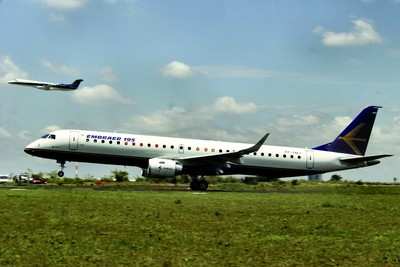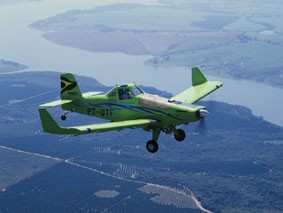Planemaker Produces Ethanol-Powered Ipanema Cropduster
Brazilian planemaker Embraer announced this week the creation of
the Environmental Strategies and Technologies Office, for the
purpose of integrating and expanding the company’s
environmental policies and achieving new levels of sustainable
development.

"There is a growing concern, within Embraer, regarding
environmental issues, and this is reflected in the products
developed by the company, as well as in the environmental policies
that are established," said Frederico Fleury Curado, Embraer
President and CEO. "The creation of this new office is one more
important step toward coordinating efforts for Embraer’s
sustainable development, respecting the environment."
The aim of the Environmental Strategies and Technologies Office
is to develop specific environmental protection policies. The goal
is to support Embraer in establishing strategies for reducing the
environmental impact of its manufactured products and production
processes, as well as those of suppliers and customers.
"The responsibilities of the new executive include following up,
on a global scale, the evolution of the environmental issue, thus
assisting the company in its search for alternative materials and
technologies that have less impact on the environment," said
Satoshi Yokota, Executive Vice President, Strategic Planning and
Technology Development, who will head the office.

In addition, Graciliano Campos has been named Director,
Environmental Strategies and Technologies, reporting to Yokota.
Embraer was the first manufacturer in the aeronautics industry
to obtain ISO 14001 certification, in 2002, attesting to the
company’s best environmental practices. Embraer recently
hired a consulting firm to perform an inventory of all the
manufacturing plants in Brazil, in terms of CO2 emissions, in order
to guide the company’s actions for expanding its
environmental policies.
"At Embraer we experience constant challenges, and maintaining
sustainable growth is, undoubtedly, one of the most important at
the present time," said Campos. "We will review our strategies, in
order to deal with current and future issues, minimizing the
company’s environmental impact, thus contributing to
worldwide efforts to lessen greenhouse gas emissions and global
warming."
 Embraer notes it has an
established record in environmental awareness. For example, its
E-Jets family incorporates design features that maximize efficiency
and keep emission levels well under the standards set by the
International Civil Aviation Organization (ICAO). The larger
Embraer 190 and 195 sport aerodynamic improvements leading to a
three percent decrease in fuel burn.
Embraer notes it has an
established record in environmental awareness. For example, its
E-Jets family incorporates design features that maximize efficiency
and keep emission levels well under the standards set by the
International Civil Aviation Organization (ICAO). The larger
Embraer 190 and 195 sport aerodynamic improvements leading to a
three percent decrease in fuel burn.
In the search for alternative fuels, Embraer is the first
aerospace manufacturer to certify an airplane powered by alcohol --
in this case ethanol derived from sugar cane. In 2004, the Embraer
202 Ipanema (right) cropduster became the first series aircraft in
the world to leave the factory certified to fly with this type of
fuel, which Embraer notes is three to four times cheaper than
avgas.
Furthermore, Embraer notes alcohol-powered airplane engines are
cleaner and pollute less than aviation gasoline, because, among
other things, ethanol has a neutral balance of carbon emissions in
its life cycle and has no lead in its composition, making the fuel
ecologically correct.
Embraer significantly expanded its actions for protecting and
preserving the environment in 2006. The company’s recycling
program, which began in 1998, has been making substantial gains, in
terms of efficiency. Since 2000, the recycling volume has grown
52.9%, to the current 79.6% of waste produced, such as wood,
plastic, Styrofoam, paper, cardboard, and cooking oil. The
remaining 20.4% represent materials which, for the time being, are
considered to be non-recyclable.
 Aero-News: Quote of the Day (12.09.25)
Aero-News: Quote of the Day (12.09.25) ANN's Daily Aero-Term (12.09.25): High Speed Taxiway
ANN's Daily Aero-Term (12.09.25): High Speed Taxiway ANN's Daily Aero-Linx (12.09.25)
ANN's Daily Aero-Linx (12.09.25) NTSB Final Report: Diamond Aircraft Ind Inc DA20C1 (A1); Robinson Helicopter R44
NTSB Final Report: Diamond Aircraft Ind Inc DA20C1 (A1); Robinson Helicopter R44 ANN FAQ: Q&A 101
ANN FAQ: Q&A 101





